'His death is a catastrophe': Gaza doctors mourn specialist killed in air strike
- Published
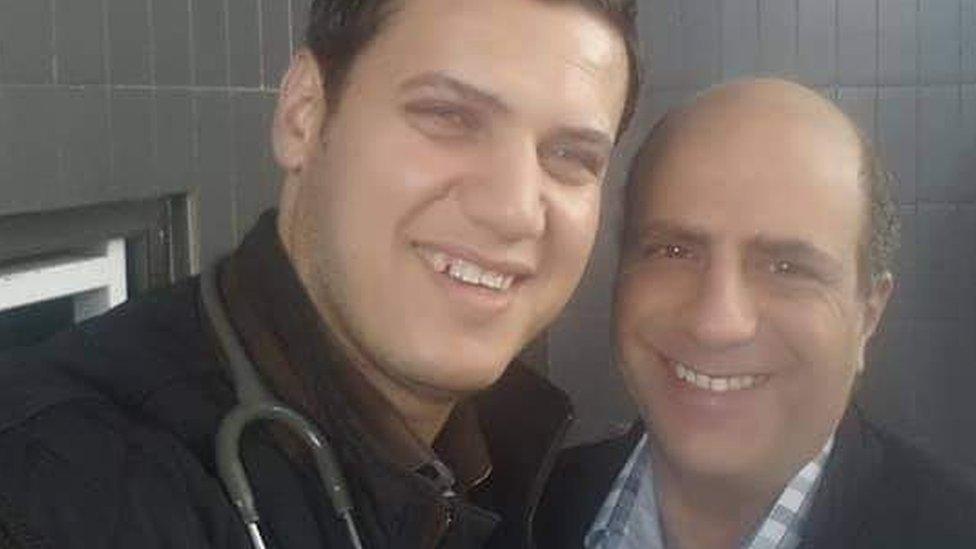
Dr Ayman Abu al-Ouf (R) dedicated his life to treating patients and training students, Dr Ghaith al-Zaanin (L) said
Without warning, an Israeli air strike destroyed the four-storey building in the Gaza Strip where Dr Ayman Abu al-Ouf lived early on Sunday.
The doctor, who was head of internal medicine at the Palestinian territory's main hospital, was killed along with 12 members of his extended family.
They included his mother and father, his wife Reem, and their 17-year-old son Tawfik and 12-year-old-daughter Tala.
"This is a really big loss not just for us personally because we knew Ayman - this is also a loss for his patients and students," Dr Ghaith al-Zaanin, a close friend and former colleague who lives in Canada, told the BBC.
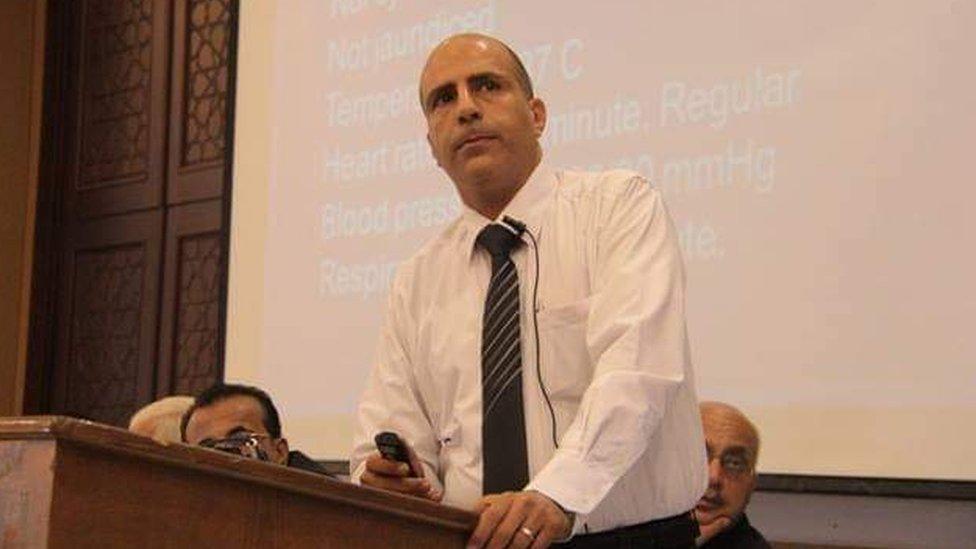
Dr Abu al-Ouf oversaw al-Shifa's hospital response to the coronavirus pandemic
As well as being in charge of internal medicine at al-Shifa hospital in Gaza City, Dr Abu al-Ouf oversaw its response to the coronavirus pandemic.
He supervised the treatment of an entire ward of people with severe Covid-19 in a place where there are few specialists in respiratory illnesses.
He also trained students from two local medical schools.
"To get someone as qualified as Ayman, you need at least 10 to 15 years of training," said Dr Zaanin, who named his own daughter Tala after his friend's.
"He dedicated his life to helping other people and treating patients, as well as to teaching our new generation of physicians. I would say he was the most kind-hearted and compassionate person I have ever seen in my life," he added.
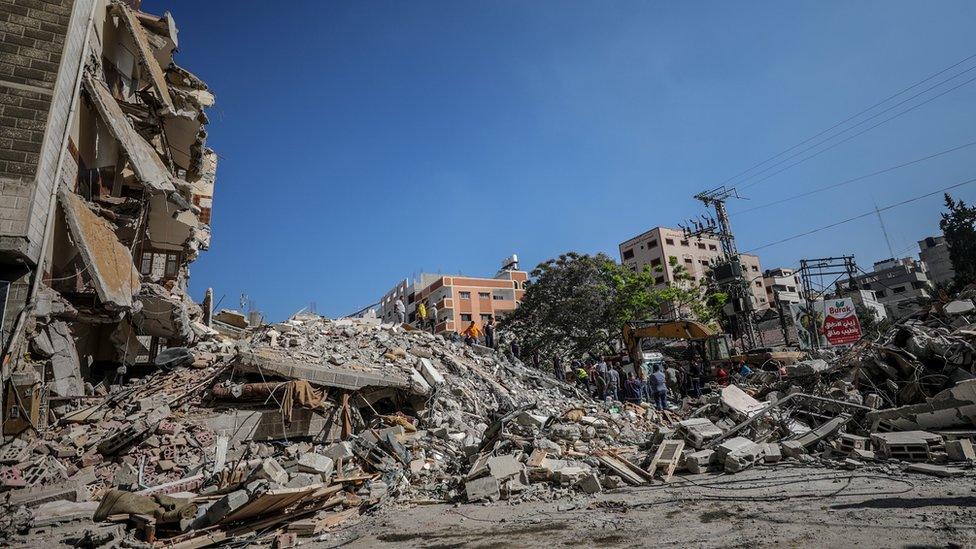
Israel said civilian buildings had collapsed after it struck an underground Hamas military structure
Dr Abu al-Ouf had left the hospital only around an hour before the strike that levelled his home on Gaza City's al-Wahda street, which is lined with apartment buildings and shops.
The Israeli military said it had "struck an underground military structure" belonging to the militant group Hamas, which controls Gaza, beneath the street. "The underground foundations collapsed, causing the civilian housing above them to collapse, causing unintended casualties," it added.
Dr Abu al-Ouf was buried under the rubble for almost 12 hours, but was alive for five to six hours, according to one of the doctors he trained, Haya Agha. His father's body was only recovered 48 hours after their home collapsed.
"No-one believed that he was dead until a doctor in the hospital sent us a picture of his body," Dr Agha told the BBC.
"His death is a catastrophe," she added. "He took on the load of three or four doctors... and he was so hardworking that we thought he was invincible."
Dr Agha said Israeli strikes had also destroyed roads leading to the area and al-Shifa hospital, making it even harder for rescue teams to get there in time to save people that day.
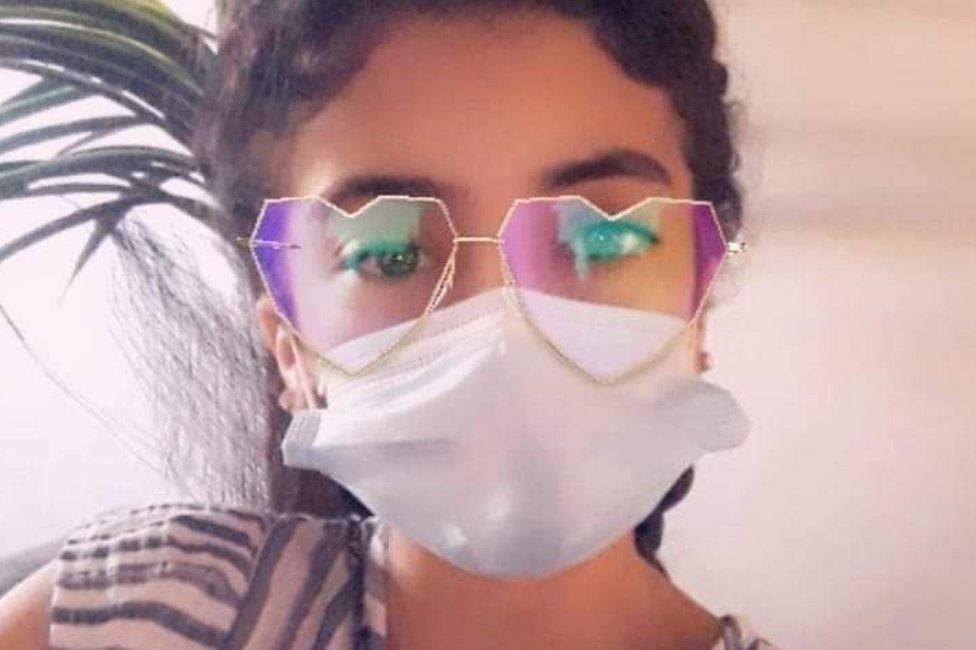
Dr Abu al-Ouf's 12-year-old daughter Tala was also killed in Sunday's air strike
Dr Abu al-Ouf's 15-year-old son Omar is the only member of their family who survived the attack. He is currently being treated for his injuries and does not know that his parents and two siblings are dead.
Omar's brother Tawfik was in his last year of high school and dreamed of pursuing a degree in chemistry. His sister Tala's seventh-grade teacher said she had been an excellent student, interested in religious classes, and had liked to memorise the Quran.
Gaza's health ministry says at least 227 people, including 102 children and women, have been killed in Israeli strikes since the hostilities between Palestinian militants and Israel began on 10 May. In Israel 12 people, including two children, have been killed in Palestinian rocket attacks, its medical service says.
The Israeli military says it has attacked only what it regards as military targets, and that it is doing its utmost to avoid civilian casualties.
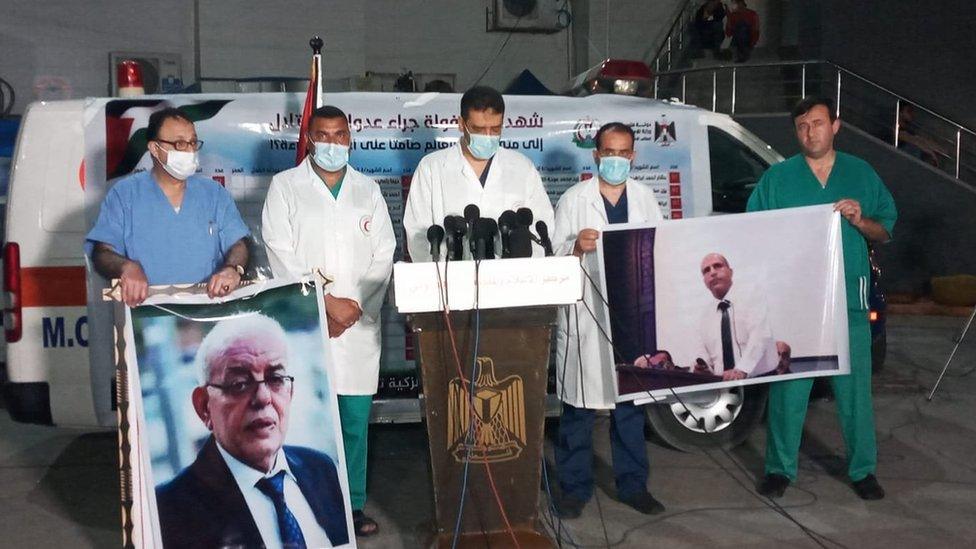
Doctors condemned the killings of Mouin al-Aloul (L) and Ayman Abu al-Ouf (R)
Also among the 42 Palestinians killed on the same day as Dr Abu al-Ouf and his family were Dr Mouin al-Aloul, Gaza's top neurologist, and Rajaa Abu al-Ouf, a psychologist.
Six hospitals and 11 primary healthcare centres have also been damaged, along with Gaza's only Covid-19 testing laboratory. Another hospital is not functioning because of a fuel shortage.
"It is unfair. It is completely unjust that they kill innocent civilian people. They are not just destroying the physical infrastructure, they are killing our human resources," Dr Zaanin said.
Gaza's fragile healthcare system, which has been weakened by years of conflict and a blockade imposed by Israel and Egypt, was already overloaded before last week because of a surge in Covid-19 cases. There was a shortage of intensive care beds, ventilators and other equipment.
Now, the fighting has added to the burden.
"The type of injuries doctors are getting have not been seen before. They need complicated surgeries and most doctors are not trained to do them," Dr Agha said.
Dr Zaanin said he had left Gaza in 2017 because he wanted specialist training unavailable there.
Both he and Dr Agha believe the loss of physicians like Dr Abu al-Ouf will have a significant impact.
"Dr Ayman left a happy memory in the minds of all his patients... I wish we could have had a chance to at least say goodbye," Dr Agha said.